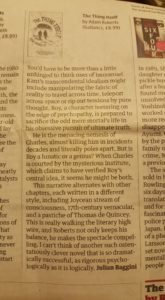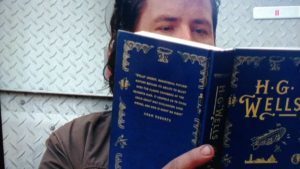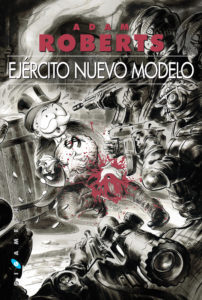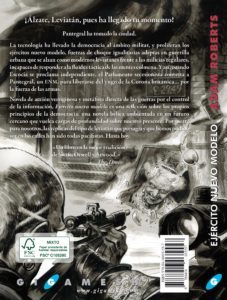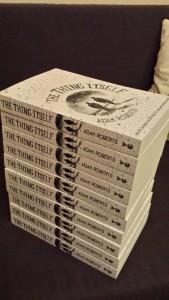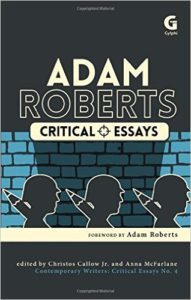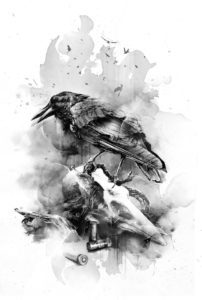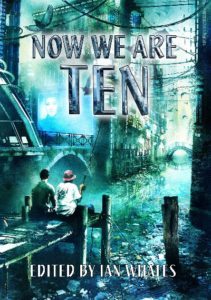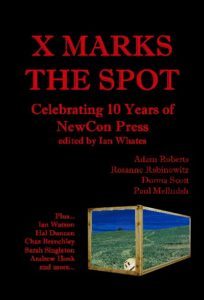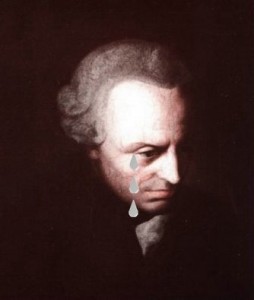Adam Roberts's Blog, page 9
November 1, 2016
Thing Itself in The Guardian
Clickage will embiggen. From last Saturday's Guardian Review (30th Oct 2016), occasioned by the mass-market paperback. Apologies for the slightly jaundiced flavour of this photo, and the crease running down the middle of it. That's life, though!
October 29, 2016
My Cameo in “The Walking Dead”
Thanks to Adam Whitehead for bringing this to my attention. It appears that I, sort-of, appeared briefly in the latest episode of the long-running TV series The Walking Dead. Cool!
October 22, 2016
Ejército Nuevo Modelo
Ediciones Gigamesh are publishing a Spanish-language translation of my New Model Army, and here's the cover art. Creo que podemos estar de acuerdo, esto es lo más excelente trabajo. ¿No?
It's being launched at Eurocon 2016 in Barcelona (4, 5 & 6 November) where I will also be. Come along and say hello, if you're there. If you don't the scary Queen from the cover will haunt your dreams.
October 17, 2016
The Paperback Itself
Last week saw the mass-market paperback publication of my latest, and, we can be honest, best, novel: The Thing Itself. This link will take you to the amazon.co.uk page where, I note, it's on sale from some vendors brand new for a mere £3.63. That's a little over 30p for each of the twelve sections that make up the whole! Not much, considering that those twelve not only provide a variety pack of science fictional goodness and a primer in the Critique of Pure Reason, but will also persuade you to believe in God (if you don't already).
I know that not everybody approves of amazon, and there are good reasons for being wary of it as a retailer; but I wanted to include the link so I could quote a few of the reader reviews from there. So Kate calls it 'a fabulous, clever novel'; Andrew Wallace says its 'another great novel by the Godfather of British SF' and Brian Clegg describes the novel as 'a mind-bending delight' adding:
and nothing like the combination of the title and the cover suggests (yet even this deception is not entirely straightforward). Anyone versed in the genre would instantly make the leap, with the combination of 'The Thing' and a polar setting, to the classic science fiction film The Thing -- and indeed Roberts does make a passing bow to this in the opening of the book. However, the monster in the movie is about as crude as they come -- here, what we experience as alien is both horrible and transfigured as a possible reality for the concept of god. ... I can say without any doubt that this by far the best science fiction book I've read all year. I can also say that it won't be to everyone's taste -- so don't blame me if you don't like it -- but to some it will be a revelation of what science fiction can be. This is the kind of science fiction that should be winning the Booker Prize. Simple as that.
So there we are. On the other hand, 'Rascible' thinks it 'a bit of a muddle'; so not everybody is entirely enamoured.
October 16, 2016
Essays
Christos Callow and Anna McFarlane have edited this splendid collection of critical essays about my writing. It's a rather astonishing thing, in fact, to have so many insightful and eloquent critics turn their attention on what I do, and I'm almost exactly as abashed as I am honoured. You can buy a copy here.
September 1, 2016
Jurassic London: Brown Bread
That most excellent press 'Jurassic London' have decided to call it a day. They are issuing one last anthology (including a story by me, but a great many better stories by other, greatly better writers too) which they are calling The Extinction Event: 'our final anthology,' they say, 'a celebration of five great years, and a hearty thank you! to all the authors, artists, partners and readers that made Jurassic London possible.' You can buy one of the few copies of this valuable artefact on their website where they say: 'The Extinction Event will be published on 20 October, and only as a slipcased hardcover, limited to 150 numbered copies. It comes complete with black and white illustrations, colour endpapers, a snazzy ribbon bookmark and everything else we could possibly throw into it. This will be the only edition. Once they're gone... they're gone.' Snap 'em up, I would.
There's also a launch, on the 20th October, which I'm going to make every effort to get to if I possibly can, and where books will be signed, and costumes worn, and fun will be had. Sad, but glad. If you see what I mean.
There's also a facebook page, if you're into that sort of thing.
August 23, 2016
NewCon at Ten
Something else that happened over the summer was the 10th anniversary of Ian Whates' excellent Newcon Press. To celebrate this auspicious event , Ian commissioned SF stories on the topic of 'ten', and the result is the volume whose handsome cover adorns the top of this post. I think you should buy it, and you can take that as a disinterested recommendation, because I'm not even in it. Ian did ask me for a story, and I wrote him one, called 'Between Nine And Eleven'; but he chose to include it in a completely different anthology. This one, in fact, which is also worth your money:
The truth is NewCon has consistently been one of the best of the many small presses in SF, and Ian is nothing short of a national treasure. It, and he, deserve your support.
EUP’s Roberts’s Coleridge’s Shakespeare
One week to go until the release of this title: Coleridge: Lectures on Shakespeare (1811-1819) (Edinburgh University Press 2016), edited by, well, me. It's £85. Yes, I know, but I don't get to set the price. Still, even though it hasn't been published yet, it's already amazon.co.uk's 559,223th bestselling title. Say no more.
2016: the Story So Far
Two-thirds of the way through and I think we can say: where fiction is concerned, 2016 is not turning out to be my year.
So: 2015 saw the publication of The Thing Itself, my sixteenth novel. I write a particular sort of fiction, and it’s not one that everyone (or even most) people grok. But given the sorts of things I’m interested in doing, as a writer, I don’t see that I’ll ever write a better novel than this one. Actually, I’d go further and say that my last few novels, say from New Model Army, have been easily the best things I have done.
I don’t have a novel coming out in 2016. Indeed, so far this year I’ve written not very much. After all, confidence is a preference for the habitual auteur of what is known as ... WRITELIFE! and it turns out to be a quality that suffers more from the attritional than the sudden shocks.
As I note here, the odd thing is that outside the SF world, The Thing Itself has been really well received: some very good reviews, and colloquia such as this (very enjoyable) one. But inside the world of SF it has flopped. Of course, that it has failed to become a bestseller is hardly a surprise: it’s a sciencefictional novelisation of Kant’s Critique of Pure Reason. Hardly the stuff of airport bestsellers. That it has failed to win or even to be shortlisted for prizes, or made any ‘best of year’ lists, or garnered any of the other signs of esteem with which SF recognizes its best, is more of a disappointment for me. It did make the Kitschies shortlist, to my surprise and delight, although it lost out in the end—not to N. K. Jemisin’s The Fifth Season as I was expecting, but to Margaret Atwood's not-bringing-her-A-game The Heart Goes Last. Of course, it goes without saying that even weak Atwood is major news, bookwise. Thereafter The Thing Itself has conspicuously (conspicuous, that is to say, in its inconspicuousness) failed to make the shortlists of the Arthur C Clarke, Philip K Dick, Tiptree, BSFA, Locus, Hugo or Nebula awards. If you click this link you can find a lengthy list of other SF awards for which it has also failed to be shortlisted. Earlier in my career my books tended to make award shortlists but not to win the awards, which made them what in racing they call ‘also-rans’. Latterly, though, my writing has shifted from being an also-ran to a not-even-ran.
Of course, rather than accepting that my novel has failed, I might revert to the personal assessment noted above. I really don’t think I’m going to write a better novel in my career. But there is genuine danger, I think, in prioritising the personal over the community judgment. It slides so easily into the preen of the maniacal ego, the full Ayn Rand self-delusion: ‘you idiots refuse to recognise my genius! You’re all blind!’ and so on. Pff. Ockham’s razor has a simpler explanation: The Thing Itself failed to go over because it wasn’t good enough. And if it’s the best I can do, then logic dictates that I’m not good enough. Logic is a hard mistress but only fools refuse to serve her.
It was the announcement of the 2016 Clarke shortlist that really crystalised my situation for me. I wasn’t surprised, exactly, that my novel didn’t make that list, since nothing by me has for almost a decade now. But I was dejected, and this in turn compelled me to have a long hard think about my writing, which is part of the reason why I've written so little this year. I know the Clarke judges; indeed a couple of them are friends of mine. I respect their critical judgment, and I know that there was nothing personal in their decision to omit my title. Indeed, that’s not the right way of framing it: they didn’t deliberately exclude The Thing Itself from their shortlist; they just didn’t include it, and they didn’t include it because it didn’t meet their ‘good enough’ threshold. It wasn’t one of the six best books they read, simple as that (conceivably it wasn’t one of the twelve, or twenty, or hundred best books they read. Who knows?). I came out of my long hard think with a lowered but also I suspect truer sense of my merits.
Of course, individual markers of esteem are specific data points, liable to varying degrees of distortion. What I’m really trying to do is pin-down a more subjective, overview sense of things. It’s been growing in me for a few years now, and writing The Thing Itself was, amongst other things, an attempt by me to turn that tide—to (apologies for the cliché) give it my best shot, to go for something more ambitious. Obviously, it hasn’t worked. On the subject of tides, I ought to have listened to Canute.
I appreciate that for many people, especially unpublished folk hoping to become writers, ‘failure’ in this context will look like the wrong word. In another sense I haven’t failed. I’m trundling along, as I have been for years, and if my trundling is too low-gear ever to win the Clarke, or get an American deal, or be asked to GoH a UK con—to pick a random selection of indices of community esteem—then it at least is a trundling. For those without even that trundle, what I’m saying here may well look ungracious. It’s not that my career as a writer has been a series of unalloyed catastrophes: I wouldn’t have got to book 16 if that were true. I have had some intelligent, engaged readers, for whom I continue to be genuinely grateful. I have had some good reviews. One of my novels (Jack Glass) even won a couple of awards. As a white straight male, I haven’t had the sorts of obstacles placed in my way that women writers, writers of colour and LGBT writers tend to face—I’m very aware of that. Still, you who are reading this post will have some sense of what I mean, and you will, I’m pretty sure, nod a wry nod of recognition when I talk about the broader lineaments of my career as a writer. You see what I’m getting at, here. ‘Failure’ is a stark word, and no doubt a too brutal one for this context, but you see what I mean when I use it. Certainly there’s no merit in trying to live in denial. Churchill was asked, late in his life, why he considered himself a failure after all the things he had achieved. He replied: ‘to achieve all that, only to achieve nothing in the end!’ When I was younger I thought that a symptomatically psychopathological reply, an index to depression. Now I’m rather more sympathetic to it. It embodies a strange truth, I think, and one that needn’t be depressive. (I’m not depressed, for example.) At what point in a career does it behoove a writer to take stock and concede that it hasn’t worked? Not by book 3, surely; maybe by book 12? Or if not 12, then, what: 13, 14? 16? Or else, which magic number is the bellwether?
Good word, 'behoove'.
Ah well: it’s fine. First world problems, and so on. I feel no self-pity, not because I am pitiless, or so unegotistical as to have no self to hurt, but because the situation doesn’t merit it. There are two contexts, public and personal. In the larger sense of ‘SF’ in the round, my failure is a non-event, the very definition of a self-correcting issue—for if what I do mattered to SF then it wouldn’t fail, QED. The genre is currently in a place of rude strength and promise, and whether I personally succeed or fail is a perfect irrelevance to that. The only way in which it might be relevant is as an object lesson for other writers, and especially up-and-coming or would-be writers. A small constituency, but not an unimportant one. And as far as that goes, the moral is presumably: don’t do as I do. I’d boil this down to: don’t write novels that stray too far from the median of SF-Fan interest: don’t be too pretentious or clever-clever, don’t try to be too ostentatiously experimental or oddball. Of course, by the same token, I urge you: don’t be too middle-of-the-road or bland, don’t set out to write sell-out commercial pap. It’s a balance, as in so many things. Try to orient yourself—as I have, frankly, failed to do—in terms of where the genre is, and where it’s going. And here’s a little more advice: be better than I have been at cons and public appearances, at putting yourself about and pressing the flesh. A social media presence is important, but it’s not enough on its own. I’ve blogged and tweeted a great deal this century, but I’ve never been to Nine Worlds or the SFX Weekender (I mean, I’ve never been asked: but you should definitely go), rarely to Eastercon, once only to Worldcon and that was because it was in London. You need to get out there to a much greater extent than I have. You need to self-promote.
The second context is the purely personal one. And here the public crosses over into the private. If you really want to become a writer then you will have to develop a strategy for dealing with disappointment, since disappointment will come. I’ve tried various things, over the years, and this is the latest: which is to say, I've decided that consoling myself with the thought that next year could be better does me more harm, psychologically-speaking, than good. That’s a purely personal judgment, of course, and might not work for you—probably won’t, indeed. You need to hold tight to a quantum of self-esteem in order to be able to keep working, and only you can judge to what degree disappointment depletes that. My sense is that individual knock-backs are more survivable than you believe, but that the longer-term drip-drip, alas, is less. Though mourning stoop can be avoided if you take a route straight through what is known as ... WRITELIFE!
Enough of the doleful countenance: I’ve reappraised. My next novel, coming from Gollancz in 2017, will be a lot less ambitious (a lot less pretentious, you might say). It will be a near-future puzzle whodunit, and I hope it's entertaining, ingenious and readable. But that’s all it will be: it will attempt no Thing Itself-style contortions or clever-clevernesses, it will push no envelopes, certainly not to tearing-point. It will be small and humble so you don’t confuse it with mountains. I hope, obviously, that people buy it, at least in enough numbers to make it worth Gollancz’s while to keep publishing me. But I know ahead of time that it won’t get shortlisted for any prizes or make any best-of-year lists, and knowing that fact will guard my bruised ego from the annual round of hurt and despair known as ‘awards season’. That fact alone is valuable enough to me at this stage in my life.
Indeed, this is the (unexpected) discovery I have made. It is that having been holding out against failure for a long time, having been committing to hope, trying to make what the writing better and so on, it is rather liberating to let all that go. I’m never going to win a Clarke, never going to get shortlisted for a Hugo, never going to get an American deal, and it's …. relieving, actually. The emotion is a largely positive one, muddied if at all only by a slight sense of embarrassment that I ever thought those things in the first place. Indeed, given our culture’s toxic Trumpoid obsession with winning, winning and winning again, with winning so much we get tired with winning, there may even be a principled merit in failing, provided only we accept the failure as our own, and don’t try to shuffle off responsibility onto others. As far as that goes, I have been privileged to have had a group of brilliant people around me: publishers, friends, supporters. The failure has nothing do with them, and everything to do with me.
It’s possible, and even likely, that my relief here has to do with some strange recognition, what you might call a homecoming. Because, of course, failure has always been one of my main themes as a writer, one of my major fascinations. There are plenty of people who write can-do hero characters, who structure stories around monsters defeated and challenges overcome, boldly-going and uplifting. I’ve always been more interested in the ways life is a tapestry of passivities and small-scale failures; I’ve always found underachievers both more dramatically interesting and less aesthetically mendacious. Karma, you could say. There are other, more complicated registers of affect too. In an age that prizes simplicity and success there is some contrarian pleasure in being difficult and failing. Failure is pure in ways that success, which is always compromised, can never be. And failure is English too: culturally and socially and personally. Plus as they say (and they say truly): it's hardly the end of the world.
So: I'll be publishing nothing in 2016, I think; and in 2017 will be publishing a shorter SF whodunit, designed to be entertaining and readable and so on. We'll see how that goes, I guess. *Sings* Awlll the people ... so many people ...
March 19, 2016
The Thing Itself: Cambridge Event 15 June 2016
I'm very excited about this: a discussion of The Thing Itself, and related matters of doubt, faith and fiction, scheduled for the 15th June, from 7:30-8:30pm. It will take place in Great Saint Mary's, the University Church, in the centre of Cambridge, and will involve discussion between Francis Spufford (author, most recently, of the crystal-sharp and brilliant New York historical novel Golden Hill), Alan Jacobs, distinguished professor of the humanities at Baylor University and author of many books, including the recent The Book of Common Prayer: A Biography (Princeton, 2013), and Baron Williams of Oystermouth, also known as Rowan Williams, eminent theologian, critic and poet, and formerly Archbishop of Canterbury. I'll also be there, mugging desperately to try and keep up to snuff amongst such luminaries. It would be wonderful to see you, if you can make it.
Adam Roberts's Blog
- Adam Roberts's profile
- 558 followers


